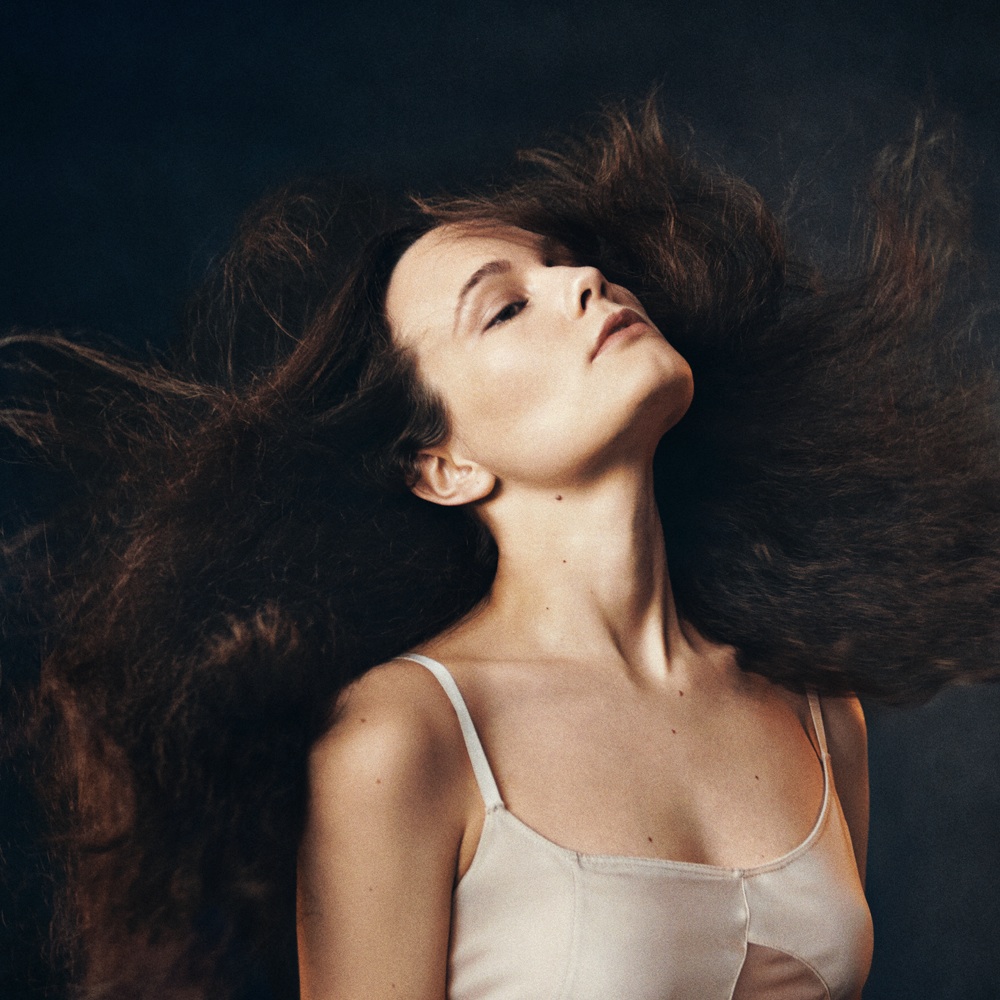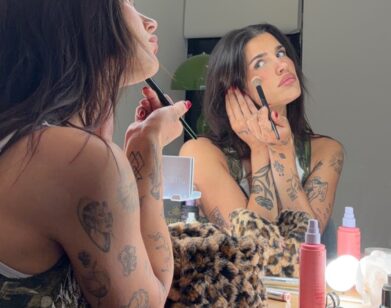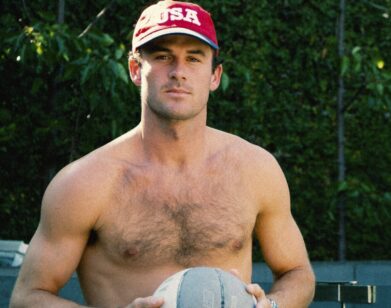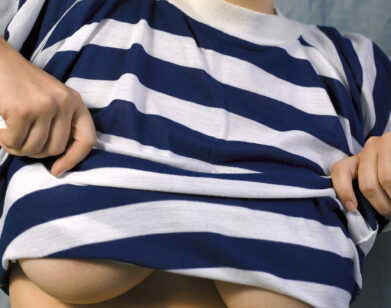Melia Marden
“it’S become more acceptable to bring a level of Your perSonalitY to cooKing . . . a lot of tHe recipeS were taKen from mY mom.” Melia Marden
In most homes across the U.S., one room is traditionally set aside for the pleasure of eating. It is often called a “dining” room. In New York City, especially in Manhattan, those rooms are outsourced to places called restaurants, and ever since it opened in 2009 in a subterranean storefront of a Bond Street townhouse, The Smile has served as a communal dining room for many of the colorful characters in the neighborhood. Whether The Smile’s 32-year-old executive chef, Melia Marden, realized she was embarking upon a major career in cuisine when she agreed to set up the kitchen and put some of her favorite recipes on the menu, much of her life has revolved around the three ingredients of her success: delicious food, creative gatherings, and New York.
Marden was born and raised in the West Village, the second daughter of the painters Brice Marden and Helen Marden, and the younger sister to photographer and former gallerist Mirabelle Marden. She grew up in the center of the New York art world in a family that was not only passionate about painting, but also about travel and food. (Examples of how her life has been a little different than most of ours: She was photographed at age 3 by Robert Mapplethorpe; when she was 14, she interviewed writer Fran Lebowitz for this very magazine.) It was two experiences in particular—summers spent at the Marden home on the Greek island of Hydra, and her mother’s preparations for dinner parties (particularly the Moroccan elements)—that are the inspiration behind much of her cooking.
After college, Marden tried her hand in a few industries, went to culinary school, worked in catering and as a private chef for a family, and assisted food artist Jennifer Rubell for three years in, among other projects, testing her recipes as food editor for Domino.
Starting up the kitchen at The Smile, though, has proved Marden’s most stunning contribution to the culinary cityscape. She describes The Smile’s food as “Manhattan Mediterranean,” implementing her knowledge of Greece and Morocco along with the cuisines of Coastal Italy, Southern France, and Spain in the delicious, spice-inflected but surprisingly straightforward dishes that taste like a human being had some hand in roasting the fish or mixing sea salt and citrus over a salad, a human being you might want to sit down with later over dessert. The Smile was a hit pretty much immediately and in 2012 spawned The Smile to Go on Howard Street in SoHo (to attempt to cross that street at lunchtime is to fight a very fashionable, hungry horde waiting in line).
In April, Marden is putting out her first cookbook, Modern Mediterranean (Abrams-Stewart, Tabori & Chang), a stylish, no-nonsense guide to creating some rather choice staples such as Moroccan chicken; fish stew; lamb shank; watermelon salad; pomegranate, thyme, and goat-cheese pizza; grilled Mediterranean dorade; and sangria gelatin. The Smile regulars will find a few familiar meals amid the pages, as well as memories of Marden’s fond experiences with certain dishes, how she has amended them and made them her signature, and old photographs of her family sprinkled among the recipes.
This past December, Marden met up with her old mentor and friend, Jennifer Rubell, for lunch at the Breslin to discuss what it means to merge food and art—a chef’s kitchen with a New York life.
JENNIFER RUBELL: Here’s a subject I thought could be interesting for us to talk about. It’s a subject I never really want to talk about and you probably never want to talk about. It’s about coming from a family that is deeply involved with art—a family that many people have an idea about—and then going on and doing something that’s in some way related to art, something that’s neither in opposition to your family or in line with your family . . . Okay, if I sat down for an interview and someone just asked me the first question I’m asking you, I’d say—
MELIA MARDEN: I’m leaving.
RUBELL: [laughs] Right.
MARDEN: I think it was a lot easier for me to do something that isn’t technically in the art world. It is now, at least. When I was younger, I was hanging out with my parents more and involved with their circle of friends, and a lot of them only care about the art world.
RUBELL: Everyone in the art world only cares about the art world.
MARDEN: Yeah. I suppose in the beginning it was hard to do something outside of that. Maybe I felt like I wasn’t connecting in some way. But now I feel it is much easier—just being able to appreciate art and artists without being directly involved in their field is good for me.
RUBELL: I actually don’t know much about your early career path except where it intersects with mine. But your path to being a chef seems a little different than, say, a Mario Batali path—the brutal line-cook path to becoming a chef.
MARDEN: I do wish now that I had worked in several giant kitchens, cooking under some mean, scary chef. Ten years ago, you couldn’t really become a chef without doing something like that. But I think cooking became much more cool and popular culturally, and people like me felt like they could get into food in a way that they couldn’t before. But I do often wish I had undergone more training.
RUBELL: What are the things you don’t know how to do that you wish you knew how to do?
MARDEN: I wish that I didn’t have to figure out really simple things on my own—like setting up a kitchen. If only I had had more examples, I wouldn’t have to make all these painstaking mistakes for no reason. Starting at the bottom is beneficial. But then again, I may never have become a chef if I had spent years being berated by some Frenchman in the kitchen.
RUBELL: [laughs] With the tall white hat.
MARDEN: Right. It’s almost scary how up-in-the-air my career was after I graduated from college. I could have ended up working at a fashion magazine. There was just a moment where I didn’t know what to do, and I had a post-college crisis and started cooking, which, I think, is how a lot of people get into cooking.
RUBELL: Almost no chefs are artists, because it is often perceived as an entirely different discipline. But in your case, did you feel like you were trying through food to get some abstract ideas into the world?
MARDEN: A little bit. I don’t feel like I’m creating art. I feel like people in the art world will often say that cooking is art to make it seem meaningful. It’s like saying, “But cooking is art!” is some attempt to make me feel better about what I do. [Rubell laughs] Which I don’t think is necessary. What I like to do isn’t even about specific dishes; I like creating an atmosphere or a certain mindset or a feeling that a restaurant or a dinner party provides. It involves a certain aesthetic and a certain intangible sensibility that is mine. In that way it relates to art—having something that you’re trying to create and doing that with different pieces.
RUBELL: You capture that irreducible aesthetic in your cookbook. And I think in the book you frame it in a certain way that everyone can understand.
MARDEN: The fun thing about doing a book is it’s really visual. I am very happy with the recipes because I’ve been working with them for a while. But it was fun to be able to include the way I serve food at home—with crazy napkins and dishes and toys and bits of paper I collect. It’s nice to have a document of how I like to show food—to have a solid representation of your work as a chef.
RUBELL: A physical object.
MARDEN: Yes. The interesting thing about cookbooks is that they get dated so quickly, but that’s kind of nice. When you look through old cookbooks, it’s like you’ve forgotten what food looked like in the early ’90s or the ’80s or the ’50s. There’s a very specific aesthetic to food from each era. If you look at Martha Stewart’s first book, it’s entirely different than her aesthetic now.
RUBELL: It’s wild looking at early Martha Stewart. When you know someone’s work publicly over time, you kind of assume it always was that way when, in fact, it’s been e-fucking-volving in front of you and you haven’t even noticed it.
MARDEN: Her early stuff was so formal.
RUBELL: It was so formal, very Connecticut.
MARDEN: But I think what’s formal now has changed. Very few people are doing puff pastry on silver platters.
RUBELL: Though I’m sure in five years people will say, “All I want to eat is classic French food.” Everything goes in cycles.
MARDEN: I agree. I think people want a certain level of service or something special with their meal. And they don’t necessarily want a cookbook that feels really unprofessional. Or maybe they do, but I think for a long time there has been this emphasis on everything being easy, casual, accessible, and it doesn’t always have to be that way.
RUBELL: How would you describe yours?
MARDEN: I don’t know. It’s a synthesis of all the kinds of cooking I grew up with, and I think it’s also the way a lot of people cook now. And it’s influenced from different travels. I tried not to get stuck in one mindset, although it is seasonal and somewhat informal . . . I can’t really sum it up.
RUBELL: One thing about it for sure is that it’s very cool. Except you won’t admit to that. You will say, “Oh, I’m not so cool.” But at a certain point, after thousands of people tell you how cool you are, you just have to accept that that’s the way you’re perceived in the world, whether or not you believe it to be true.
MARDEN: I don’t know if the waitresses at The Smile would agree. They’re all 300 times cooler than me. I’m like the dork in the kitchen, but that’s fine.
RUBELL: One thing I’ve always admired about you is that you have a style and a certainty. I get my haircut and think, “Is this my new look?” I’m in a constant negative dialogue with myself about who I am visually. I have a certainty about the visual qualities of what I do in the world, but personally, I’m a mess! But you have a total certainty. How do you have that?
MARDEN: [laughs] I steal it from other people. And you always have some cool new hairstyle. I basically never have a new hairstyle. I’ve had the same hairstyle since I was 10.
RUBELL: It’s helpful not to change the hair all the time, but I can’t help myself.
MARDEN: I think I copied my sister [Mirabelle Marden] growing up. I just had the more pared-down version of her style, so I don’t have as much innate style as she does.
RUBELL: What do you wear to cook in?
MARDEN: Sweatpants. Actually, I wear a chef coat and really comfortable yoga pants and sneakers. It’s the most boring thing in the world. But it’s nice because I never think about my presentation.
RUBELL: Part of a magazine story is to promote whatever you’re selling. The other part is to put things you want out into the world. Like, if you’re looking for a boyfriend you should definitely say so in the interview . . . Although I know you’re married. If you want someone to design your chef getup, you should definitely say so. That way a designer can read it and call you up and say they’re going to do that for you. Who would you like to have design your chef uniform?
MARDEN: Hmm . . . It would have to be sleek. I don’t know. I think J. Crew would be cool. I mean, I know that’s not fancy. I should say Chanel. Karl Lagerfeld . . .
RUBELL: Did you hear that, Karl? Okay, Chanel chef outfit. What about Lanvin?
MARDEN: Ooh, yeah, in silk with chef’s pants with jewels on them.
RUBELL: I know this is an annoying question, because you’ve just finished a book and you have two restaurants going, but what are you working on next?
MARDEN: We’re working on expanding The Smile in terms of catering, because with Smile to Go, our take-out place, the kind of food I make is almost best suited for a family-style buffet or picnic-style eating. So many of my recipes are things you can make and have stand out and are delicious at room temperature and don’t fall apart after one second and don’t need to be intricately plated. So I’m working on adding catering and expanding The Smile to Go idea. And then I would like to do another book. I really liked working in the visual medium, working with the photographer and set designer and gathering the props. And I liked testing the recipes. I feel like at the restaurant I take recipes that I make at home and make them into restaurant recipes so they can be made in big batches. With the cookbook, I was reversing that and taking them back into smaller portions that you could make at home.
RUBELL: Do you think the recipes were improved by that process of going through the restaurant and coming back?
MARDEN: I hope so. Almost everything in the restaurant is something I cooked at home first, just for me and Frankie [Marden’s husband, Frank Sisti Jr., a.k.a. Kid America]. So all of the dishes were already something you could make in a home kitchen. The problem with my restaurant cookbooks is that they involve all of these steps that you would never do at home, where you don’t have all of these other people helping. But yes, it’s always good to go through recipes again and retest them and see what is the essence of the dish.
RUBELL: What’s it like having people work for you in the kitchen? You say you never worked under a mean, scary chef, but what’s it like being in that role as a woman?
MARDEN: It’s hard. Chefs can be mean because of a power thing, but I think it’s also partly because it’s stressful and you have to get what you want out of people. People have a tendency to do things their own way. It’s hard for me to yell at people. But I do think you have to learn to ask for what you want.
RUBELL: Do you mostly have men working in the kitchen with you?
MARDEN: I did. Right now I have two women on the line and one man who’s my sous chef who kind of runs the kitchen when I’m not there, and then at our other space it’s all men, and the pastry department is all women. It’s so hard to hire people. I’ll take anyone who’s not crazy and can do the job. It’s hard to have a boss who is constantly nagging people. But that’s life. Maybe we should talk about how I probably stole all of your recipes and you just don’t remember. [both laugh] I think there are definitely recipes that are similar.
RUBELL: I feel bad when I see some slight glimmer of myself on your menu.
MARDEN: Definitely the brisket that we’re serving at The Smile—
RUBELL: Is from me?
MARDEN: It’s very much based on your brisket.
RUBELL: [laughs] I’m very proud.
MARDEN: It’s good, people like it.
RUBELL: If someone sends it back, it’s not my fault. So do you have a mega-ambition? Do you have something you eventually want to pursue?
MARDEN: I don’t know. I’m so bad at being ambitious. Even The Smile appeared as an opportunity and all of these things just kind of happened. What I’d like to do in a very ambitious way is a cookware line. I feel like there could be more clean, brightly colored cooking products. At Smile to Go, we have collected all of these vintage Dansk enamel pans. They’re great, but now they’ve become way too popular and you can’t get them on eBay anymore for the price you used to. So I would make something simple and affordable.
RUBELL: Do you think people who did it the quote-unquote “hard way”—worked on the line, wanted to open their own restaurant, couldn’t get the funding, nobody wanted to partner with them—are jealous of you? When you say, “I don’t have a grand ambition,” it occurs to me that you’re one of the hardest working people I know.
MARDEN: I think if someone’s been working in kitchens for 10 years and they’re trying to scrape together to get their own restaurant and they knew about someone like me, they might be jealous. Or even just the concept that people can kind of swoop in and feel like they can run a kitchen after going to cooking school. But at the end of the day, you’re just working in a kitchen. You work in a kitchen for hours, and it’s never easy.
RUBELL: It happened in the art world a long time ago that ideas are equal to—or more important than—training and technique. Ideas are really triumphant, but I think that is a hard thing for skilled craftspeople to sometimes understand.
MARDEN: There are also people who train forever and learn amazing things and push the boundaries of cooking in a different way, but I think what I do at The Smile is this different thing. And I’m not going to end up being the head of a white-tablecloth, high-end restaurant. That’s not the direction of my life and career.
RUBELL: Are there any other chefs who are working in a vein that feels similar to yours? Or any restaurants that feel like a kindred project?
MARDEN: I read Gabrielle Hamilton’s book [Blood, Bones & Butter], and from reading it I really feel like her take on food is similar. It was influenced by her mother’s cooking, influenced by traveling. The food at Prune is very uniquely her food. It’s not something I would cook, but the idea is similar.
RUBELL: Do you think food as an intimate, autobiographical aesthetic is something you find more in female chefs, or is that just a dumb generalization?
MARDEN: I can’t think of enough female chefs. But yeah, I think it does seem true. Maybe that’s just because there are more male chefs doing that other kind of cooking. Maybe female chefs don’t feel like they have to fall into the traditional mode as much. Or maybe it’s easier to talk about it that way as a woman. And maybe it’s just become more acceptable to bring a level of your personality to cooking. I think that’s a good summary of the book—that it is like an autobiographical version of cooking. A lot of the recipes were taken from my mom.
RUBELL: But it’s also very connected to New York and growing up in the city. It has a stylist’s touch.
MARDEN: The challenge is to always maintain a natural home-cooked feeling, which is hard if you’re doing something giant—and I don’t even know if it’s possible, to cook for a thousand people and have it feel like that. I feel that my strength is cooking at home in the simplest way: picking something I think looks good and putting it together. And I don’t ever want to lose sight of that. I don’t want my restaurant ever to feel too far away from that. Maybe one day I’d like to have a professional kitchen with a wood-burning oven or elements like that. But I would still want it to feel like my house.
JENNIFER RUBELL IS A NEW YORK-BASED ARTIST WHOSE WORK FREQUENTLY EMPLOYS FOOD AND DRINK AS A MEDIA. HER ANNUAL BREAKFAST PROJECT IS HELD IN THE COURTYARD OF THE RUBELL FAMILY COLLECTION DURING ART BASEL MIAMI BEACH.







